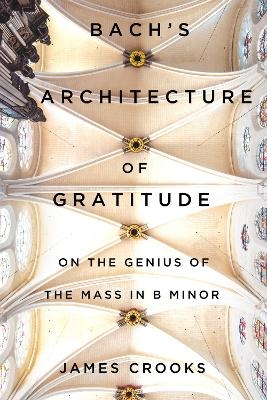
Bach’s Architecture of Gratitude
On the Genius of the Mass in B Minor
Seiten
2024
McGill-Queen's University Press (Verlag)
978-0-2280-2063-9 (ISBN)
McGill-Queen's University Press (Verlag)
978-0-2280-2063-9 (ISBN)
Every lover of music finds themselves, at privileged moments, in ecstasy – certain that what they are hearing has captured, somehow, an incontrovertible truth. Bach’s Architecture of Gratitude explores this profound aesthetic experience in a case study of J.S. Bach’s Mass in B Minor and its capacity to inspire gratitude.
Every lover of music finds themselves, at privileged moments, in ecstasy – certain that what they are hearing has captured, somehow, an incontrovertible truth. In Bach’s Architecture of Gratitude James Crooks explores this profound aesthetic experience in a case study of J.S. Bach’s Mass in B Minor – widely considered among the greatest works of the western choral canon.
The book begins with an investigation of compositional principles – of what we might call the mass’s musical architecture. Crooks argues that in its cathedral-like structure, Bach gives us a detailed map of the spiritual journey it triggers. This journey culminates in our apprehension of the world as a gift. And that means, in turn, that the mode of knowing appropriate to its musical ecstasy is gratitude. In the gratitude of aesthetic experience, we learn something crucial about the genuine nature of our own identity, our relations with others, and the character of the things around us. Bach’s genius lies in his capacity to frame these lessons in the mass’s choruses, solos, and duets.
Spotlighting the wisdom embedded in gratitude, Bach’s Architecture of Gratitude celebrates music as a pathway to understanding our deepest selves and our intimacy with the world.
Every lover of music finds themselves, at privileged moments, in ecstasy – certain that what they are hearing has captured, somehow, an incontrovertible truth. In Bach’s Architecture of Gratitude James Crooks explores this profound aesthetic experience in a case study of J.S. Bach’s Mass in B Minor – widely considered among the greatest works of the western choral canon.
The book begins with an investigation of compositional principles – of what we might call the mass’s musical architecture. Crooks argues that in its cathedral-like structure, Bach gives us a detailed map of the spiritual journey it triggers. This journey culminates in our apprehension of the world as a gift. And that means, in turn, that the mode of knowing appropriate to its musical ecstasy is gratitude. In the gratitude of aesthetic experience, we learn something crucial about the genuine nature of our own identity, our relations with others, and the character of the things around us. Bach’s genius lies in his capacity to frame these lessons in the mass’s choruses, solos, and duets.
Spotlighting the wisdom embedded in gratitude, Bach’s Architecture of Gratitude celebrates music as a pathway to understanding our deepest selves and our intimacy with the world.
James Crooks is professor of philosophy at Bishop’s University and director emeritus of the Bishop’s University Singers.
| Erscheinungsdatum | 29.04.2024 |
|---|---|
| Verlagsort | Montreal |
| Sprache | englisch |
| Maße | 152 x 229 mm |
| Themenwelt | Kunst / Musik / Theater ► Musik ► Klassik / Oper / Musical |
| Kunst / Musik / Theater ► Musik ► Musiktheorie / Musiklehre | |
| ISBN-10 | 0-2280-2063-8 / 0228020638 |
| ISBN-13 | 978-0-2280-2063-9 / 9780228020639 |
| Zustand | Neuware |
| Informationen gemäß Produktsicherheitsverordnung (GPSR) | |
| Haben Sie eine Frage zum Produkt? |
Mehr entdecken
aus dem Bereich
aus dem Bereich


